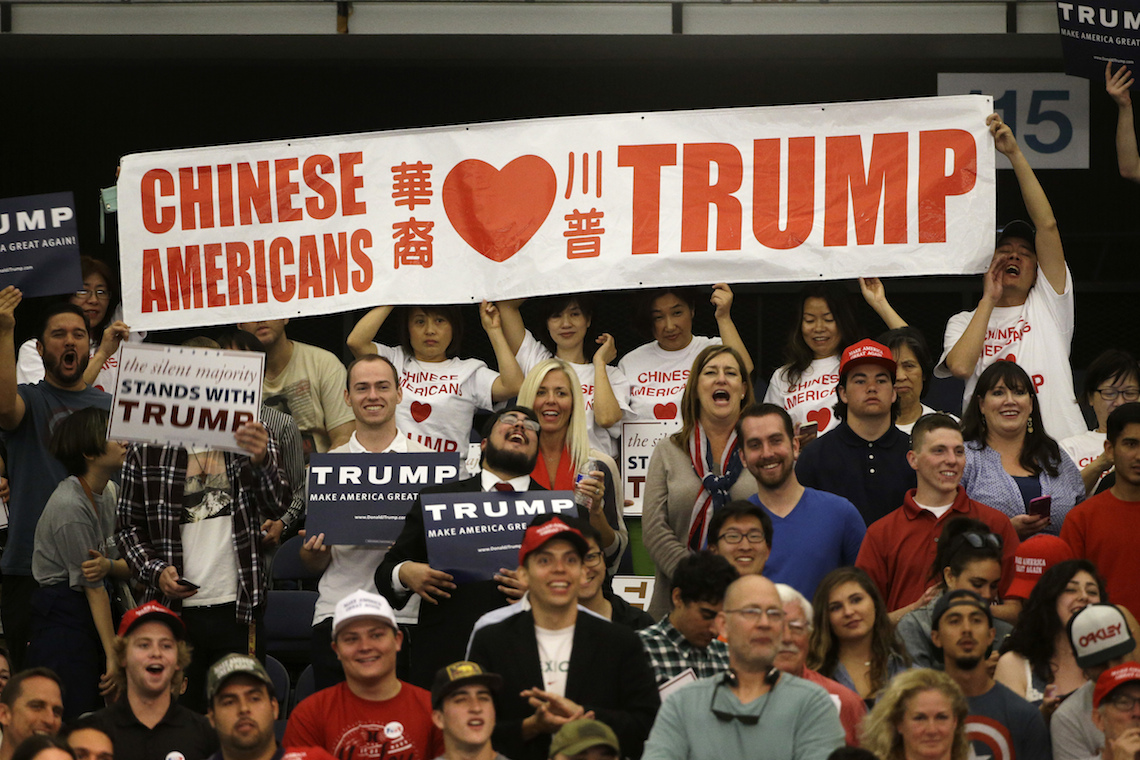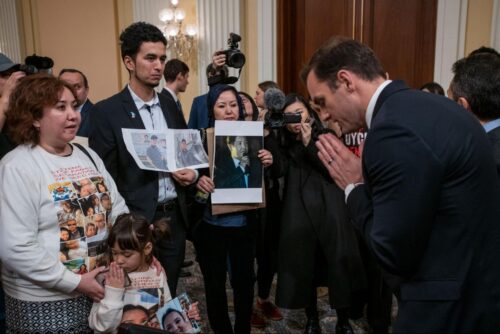Chinese Americans are increasingly siding with Trump. Here’s how liberals can win them back

“There is a ‘try a hijab on’ booth at my college campus. So you’re telling me that it’s now just a fashion accessory and not a religious thing? Or are you just trying to get women used to being oppressed under Islam?”
“Did you know that the majority of black deaths are caused by other blacks? Fix problems within your own community first before blaming others.”
— Tweets by former Miss Michigan Kathy Zhu
I have never met Kathy Zhu, the 20-year-old former Miss Michigan whose crown was stripped by Miss World America on July 19 when organizers deemed some of her old Twitter posts inappropriate. But as a journalist who has spent several months talking to Chinese conservatives in the U.S., including some who worked with Zhu to campaign for Donald Trump in 2016, I feel like I know her story inside out.
I know why she and many other new Chinese immigrants have been gravitating toward the right. And I know how American liberals, particularly those who are Chinese American, have failed to engage them.
Many of the people I spoke to for my recent story in National Review, “The Rise of the Chinese-American Right,” came to this country for higher education and, over the two or three decades they’ve been here, have not been politically vocal. In fact, they’ve had no political preference until recently, when they began to believe their middle-class lives and the future of their children are being threatened by a slew of programs bearing the progressive mark, from the legalization of marijuana to the racially conscious admissions policies of top high schools and universities.
But what has really accelerated the growth of conservatism among new Chinese immigrants is a feeling that liberal decision-makers aren’t interested in listening to them.
Last June, for instance, New York Mayor Bill de Blasio announced a specialized high school reform plan to increase the chances of admission for black and Hispanic students by abandoning an entrance exam that Asians typically excel at. Despite frequent protests by Asian residents, it took him a year to finally sit down with community representatives. In the meantime, I witnessed many otherwise apolitical Chinese parents in New York turn toward the right.
Zhu, who came to the U.S. from China when she was five, is not part of that generation. She is younger. But she too understands what it’s like for her opinions to be dismissed offhand. In a meeting of Chinese Trump supporters in October 2017 in Chicago, Zhu, who has said that she was once a Hillary Clinton supporter, told an audience about a college thesis of hers which was derided by a professor simply because it espoused conservative views.
It’s not that the left has entirely ignored these new conservatives among Chinese immigrants. Chinese liberals, many who are American-born, have been trying to entice their peers from China to their side. But their efforts have not only generated little success, but have also occasionally backfired.
In 2017, Frank Wu, a prominent Chinese-American scholar and activist, wrote an op-ed in the Huffington Post calling for his fellow American-born Chinese activists to work with new immigrants rather than rejecting them. The article was perceived as portraying American-born Chinese as superior to those fresh off the boat, and was met with broad criticism. Wu had to write a follow-up piece to clarify.
When I recently spoke to Wu, he used marriage as an analogy for the relationship between American-born Chinese and new immigrants — sometimes it’s good, sometimes it’s bad, but you stay married and belong to the same family. But I increasingly wonder if divorce might not one day be inevitable.
The real mistake American-born Chinese liberals have made is hoping that the newcomers, after learning about the oppression that the Chinese in America have faced, will band together with other minorities in the fight against white privilege. But that strategy is misguided.
The history of Asian Americans is not the history of new Chinese immigrants. The latter have rarely been taunted with chants of “ching chong” and don’t feel offended by the question, “Where are you from?” They grew up in a rising China under Deng Xiaoping’s economic reforms in a society that believed in competition, individual accomplishment, and meritocracy. They may agree that the Chinese Exclusion Act was unfair, but they are unlikely to use that history as a guide for their actions in today’s America.
In his acclaimed 2016 autobiography Born a Crime: Stories from a South African Childhood, The Daily Show host Trevor Noah tells a story of how a dancer friend in his home country of South Africa, whose English name is Hitler, created a big controversy when he performed at a Jewish school. Noah explains that his friend’s name was chosen merely to fulfill a mandate during the colonial and apartheid eras, when all black people had to have an English name, and history textbooks in South Africa simply didn’t portray Hitler as the world’s greatest evil.
“The name Hitler doesn’t offend a black South African because Hitler is not the worst thing a black South American can imagine,” Noah wrote. “Every country thinks their history is the most important.”
A more effective way for liberals to win back new Chinese immigrants is to find something in their history that carries a progressive message. For example, many Chinese immigrants arrived in the U.S. in the late 1980s and 1990s on scholarships, a portion of which were need-based. China was a poor country at that time, so there were many students who benefited. There is an opportunity here to remind new Chinese immigrants that offering some extra help to disadvantaged students, as affirmative action aims to do, is not all that unfair. This may work better than simply harping about the Chinese Exclusion Act.
I myself am not a Trump supporter, and never will be. But what I know is that right-leaning Chinese immigrants, many of whom do support Trump, are not crazy. Their choices and actions are logical in the context of their life stories. And I think it is important to listen to them, try to understand where they come from, and see whether there is common ground.
In this vast world, we are all blind men touching the elephant. Listening to others rather than shutting them up is how we get closer to the truth. It’s the only way.
Rong Xiaoqing is reporter at the Chinese-language Sing Tao Daily in New York and an Alicia Patterson Fellow.






